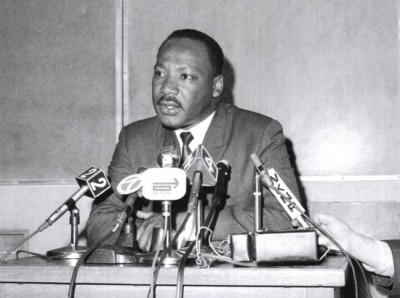Remembering Dr. King

All Global Research articles can be read in 51 languages by activating the “Translate Website” drop down menu on the top banner of our home page (Desktop version).
To receive Global Research’s Daily Newsletter (selected articles), click here.
Visit and follow us on Instagram at @globalresearch_crg.
***
Last week, we celebrated Martin Luther King Day, a national holiday dedicated to the life and legacy of this champion for equality and justice. The effort to gain national recognition for MLK Day took 14 years, from 1970 when it was first proposed until 1983 when it was passed by Congress and signed into law. It was controversial because King himself was controversial,a true revolutionary historical figure who fought racial discrimination, militarism and economic injustice.
Instead of remembering King as he really was, the meaning of the day and the memory of Dr. King have been hollowed out. He has been transformed into a fuzzy, feel-good figure and the struggles for which he gave his life have been ignored.
During his lifetime, even many of those who supported his struggle to end racial segregation in the South and secure voting rights for Blacks could not accept the broader vision he projected. When he moved the focus of his protest movement to segregation in the North, when he spoke out against the war in Vietnam, when he embraced the cause of economic justice for the poor who were denied opportunity in the wealthiest nation on Earth, he was rebuked by some who said, “You should stay in your lane” and “Why are you getting involved in issues that detract from your central message?”
By the time he was assassinated in 1968, Dr. King had become a figure of controversy for many Americans. That was to be expected precisely because the moral challenges he presented were so deeply upsetting to those who embraced and benefitted from the status quo.
With the passage of time we forget, glossing over and romanticising the past. Our hope in securing the recognition of King Day was that not only would the man be remembered, but also the realities he confronted and the injustices he opposed.
It is important to note that almost 70 per cent of the current US population were either not alive or not yet living here during King’s lifetime. They have no recollection of segregated lunch counters, water fountains and bathrooms, of the dogs and fire hoses that were unleashed on children simply because they were protesting for equality. They don’t remember the disgusting racist rhetoric used by senators, governors and others seeking to maintain the old, segregated order that King and his colleagues sought to tear down. Nor do they recall the horrors of the lives wasted in an unwinnable war in Vietnam and the trauma of a nation torn asunder by that conflict. And they do not remember the crisis of wretched poverty that plagued inner cities and rural regions, problems that then President Johnson sought to address with his New Society programmes, all of which were stymied by the costs of the war. All this needs to be remembered to understand King in the context of his time.
When we fought to commemorate his birthday we had hoped that King’s Day would be one on which we would recall this history and the sacrifices Dr. King and so many others made in their efforts to bring needed change, and would then recommit ourselves to using, if necessary, the tools he used to fight injustice, poverty and war.
Given this background, it is distressing that four decades later, with the concerns embraced by Dr. King still present, that the challenges he posed have been diluted or erased from historical memory. America is still torn apart by deep and abiding racial inequities, extreme income disparity, challenges to voting rights and misguided government budgets that prioritise militarism and waging unwinnable wars at the expense of the social well-being of citizens. In the face of these problems, it is an insult for us to celebrate MLK Day without the message of King being uppermost on our minds. We need him today as much as we needed him during his lifetime.
*
Note to readers: Please click the share buttons above or below. Follow us on Instagram, @globalresearch_crg. Forward this article to your email lists. Crosspost on your blog site, internet forums. etc.
The writer is president of the Washington-based Arab American Institute.

